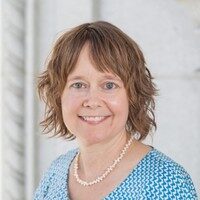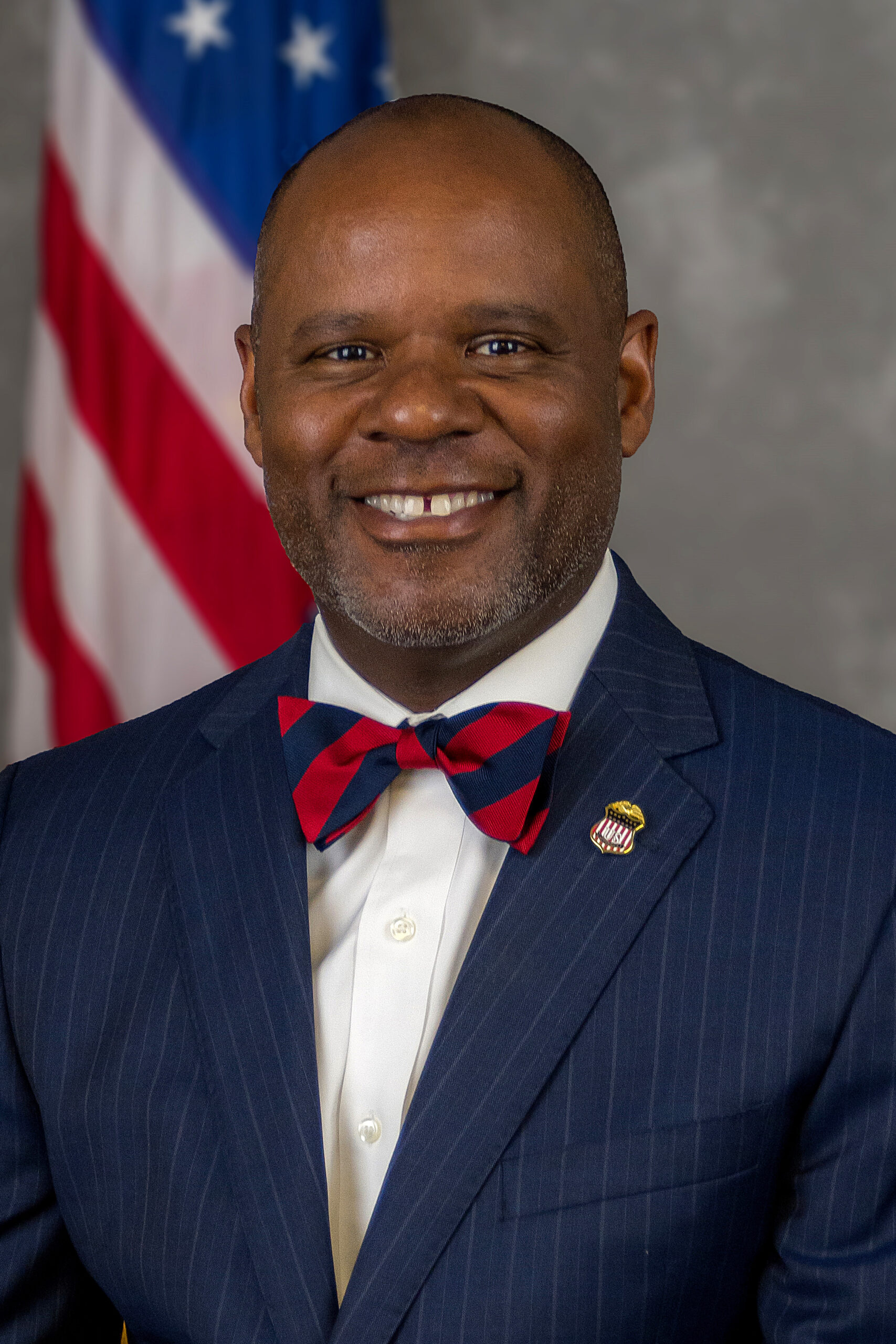Ismail “Izzy” Ramsey was in eighth grade when he first saw a courtroom in action. He recalls that his best friend’s father was the star defense witness in the high-profile Shiva Bombings trial in Alameda County Superior Court involving a group accused of blowing up banks.
He and his friend watched as Harry Kormos, a former Navy psychiatrist, testified about post-traumatic stress disorder, which doctors started seeing among Vietnam War veterans. The experience planted a seed.
“That’s how I became interested in being a lawyer,” said Ramsey, during an interview less than six months after he was sworn in as the 53rd U.S. Attorney for the Northern District of California in March.
But even before then, Ramsey was no stranger to the legal profession thanks to his father, Henry B. Ramsey Jr., who presided over the trial.
The older Ramsey had blazed a trail as the first African-American to lead the Contra Costa County District Attorney’s Office. After teaching at UC Berkeley School of Law and serving on the Alameda County bench from 1981 to 1990, he spent five years as dean of Howard University School of Law. He passed away in 2014 at age 80.
With such a role model, there was little doubt that the youngest of Judge Ramsey’s four sons would go far, said longtime family friend John Burris, an Oakland civil rights attorney specializing in police misconduct cases.
“He was always viewed as a special kid. He was intelligent, he followed his father’s direction, and he was disciplined,” Burris says.
Forging His Path
Izzy Ramsey may have followed his father into the legal profession, but he has forged his own path. After earning his bachelor’s degree at Harvard University in 1989, Ramsey served three years in the U.S. Air Force.
He continued his education by pursuing dual graduate degrees—an MBA from UC Berkeley and a JD from Harvard. Serving on the Harvard Law Review, he met future U.S. Supreme Court Justice Ketanji Brown Jackson and future U.S. Senator Ted Cruz.
“For me, the best thing about going to law school was the people,” he says, naming Professor Charles J. Ogletree Jr. as an influential teacher during his third-year criminal defense clinical.
After a summer internship at Goldman Sachs, Ramsey realized he didn’t want to be an investment banker. Instead, he wanted to pursue a career in criminal law like those prosecutors and defense lawyers he had watched in action.
Mentors advised him the U.S. Attorney's Office would be the best place to get experience.
That led to a four-year stint as an assistant U.S. Attorney in San Francisco, the office he now oversees, where he handled white-collar cases and co-founded the computer hacking and intellectual property unit.
But for the bulk of his career—from 2003 until President Joe Biden appointed him to the top prosecutor’s job—Ramsey was on the defense side. He built a reputation for representing high-profile white-collar criminal defendants in private practice.
In recent years, he helped negotiate a plea deal for San Francisco Public Works Director Mohammed Nuru, who is serving a seven-year sentence resulting from one of the city’s most extensive public corruption investigations. He also represented Anthony Levandowski, a former Google employee who pleaded guilty to one count of trade secrets theft related to the company’s self-driving car program. President Donald Trump later pardoned Levandowski before he served any prison time.
He was also on the Criminal Justice Act panel for representing indigent clients in federal court for many years. This work gave him experience in violent crime cases, including a five-month racketeering and murder trial involving multiple defendants.
“I’ve been lucky in my career; I’ve been able to cover the whole spectrum,” says the softspoken Ramsey. “And I do think all of those things have helped prepare me to step into this role.”
The U.S. Attorney needs a broad perspective. Izzy’s years as both a prosecutor and defense attorney give him perspective. You want a U.S. Attorney who understands law enforcement, knows the court, and feels for our community. Izzy is all those things. - Dave Anderson
Bringing an Insider’s View
Ethics rules may require him to recuse himself from some ongoing or future public corruption cases due to his representation of Nuru. But those who know him say his knowledge of the people and power structures will make him an effective law enforcement leader.
“The U.S. Attorney needs a broad perspective. Izzy’s years as both a prosecutor and defense attorney give him perspective,” says former U.S. Attorney for the Northern District Dave Anderson, a partner at Sidley Austin. “You want a U.S. Attorney who understands law enforcement, knows the court, and feels for our community. Izzy is all those things.”
Jeffrey Bornstein, partner at Boersch & Illovsky LLP, worked as a prosecutor and defense lawyer with Ramsey over the years.
“He is a dedicated, well-organized, and extremely passionate leader,” Bornstein says. “He is someone I have the utmost respect for, and I am confident that he will make a positive difference in the U.S. Attorney’s Office and, in general, in our communities.”
Reforming Criminal Justice
Ramsey said he was drawn back to the prosecution side partly by the promise of criminal justice reform. Defense lawyers can defend someone unjustly accused, but a prosecutor can have an even more significant impact by deciding to dismiss or not bring charges in the first place, he says.
“My father said to me, always remember [as a prosecutor], one represents the people and the defendant is one of your clients,” he says. “That’s an approach that I try to take.”
Burris says he trusts Ramsey to fairly enforce the law with an eye toward social justice, showing mercy where appropriate.
“I feel very good about him being the chief law enforcement officer because he has strong feelings about being a prosecutor and will ensure the system will not be abused,” Burris says.
Every prosecutor has to decide where to focus their finite resources. Ramsey identified his top priorities for the office only a few months into his term.
Recruiting Diverse Talent
In a nod to his father, Ramsey wants to recruit a diverse pool of young prosecutors to the office.
“Ultimately, it will help the office reflect the community we serve. That’s important to me,” he says. He is using bar association speaking opportunities and open house-type events at the Federal Building offices to educate new lawyers about their options.
Tackling White-Collar Crime in Silicon Valley
One of his top four law enforcement priorities will be dealing with corporate and investment fraud cases emanating from Silicon Valley. The world’s technology and innovation capital is vulnerable to economic espionage and trade secret theft from other companies and other nations.
Computer crimes were a relatively new phenomenon when Ramsey was an AUSA. Today, cybercrime is increasingly sophisticated, and it continues to evolve.
“When things are on the cutting edge in society, that makes laws on the cutting edge,” he says. “That’s interesting.”
Ramsey says he’s interested in working with Silicon Valley companies to educate them on the benefits of voluntary self-disclosure of bad actors and malfeasance. He also wants to get the word out to the public about how people can protect themselves against cyber scams and report scams to the federal Internet Crimes Center.
Everyday Tenderloin Challenges
The fentanyl problem is literally at his doorstep. Addicts and drug dealers roam the streets in the Tenderloin neighborhood outside his office. He has committed to helping San Francisco address the related public safety issues.
“That’s a must-win fight for the community. It’s all hands on deck,” he says. “Whether it’s using wiretaps, whether it’s utilizing certain forfeiture statutes that we have to target the ecosystem of dealers, whether it’s targeting money transmission for how suppliers or dealers move their money, we have the ability to do that, to make sure that on the entire chain of supply—from the user all the way back to Mexico where these drugs are coming from—that we are targeting every step along the way.”
Ramsey is helping coordinate local, state, and federal police and prosecutors. He has already revised the office’s intake guidelines, which describe the types of cases they will take, to ensure no gaps.
“We are not going to allow the Tenderloin to be a sanctuary for people to come and deal poison into our communities,” he says. “We’re going to be here to hold you accountable.”
We need to make sure that when it comes to hate crimes, police misconduct, or the misconduct of other law enforcement officers, we’re holding people accountable. - Ismail Ramsey
Addressing Police Misconduct
Attorney General Merrick Garland has clarified that violent crime and civil rights should be a priority for federal prosecutors nationwide. Ramsey’s philosophy is in line.
“We need to make sure that when it comes to hate crimes, police misconduct, or the misconduct of other law enforcement officers, we’re holding people accountable,” he says.
In March, the former warden at the women’s Federal Correctional Institute in Dublin was sentenced for sexually abusive conduct against three women inmates. The investigation continues, and other correctional officers are facing criminal charges.
Harnessing a Calm, Modest Demeanor
Colleagues expressed confidence that Ramsey will help address the community’s problems through a thoughtful and measured approach.
“He is open to creative solutions to crime problems through alternatives to incarceration that enable those who are committing crimes to get the help they need to stop their anti-social and illegal behaviors,” Bornstein says.
Retired defense lawyer Cristina Arguedas, who became close friends and golf partners with Ramsey after he moved into the office downstairs from her office in Berkeley, described him as unflappable.
“You cannot get a rise out of Izzy Ramsey. He is even-tempered, always, no matter how tense it is,” she says. “It’s a really helpful quality when you have a high-stress job.”
Arguedas also shares a story about his modesty. When she interviewed him on stage for a trial lawyers’ event in San Francisco this spring, she asked him about his experience in the U.S. Air Force. Officially, he left with the rank of captain. But Ramsey’s LinkedIn bio lists him as a lieutenant. Why the difference?
“He said, ‘They give everyone a bump when they leave,’” she says.
Coming Full Circle
As he walks the halls of the Federal Building these days, he runs into some of those lawyers he watched back in eighth grade. Former prosecutor George Niespolo, who is now a defense lawyer, and defense lawyers Gil Eisenberg and James Larson. Larson, who went on to become a federal magistrate judge, recently retired but is still involved in the Judicial Conference.
Although he hasn’t been in the office for long, he feels a sense of satisfaction being in a position to make a difference in his community.
“I feel a real commitment to the Bay Area. I’m a third-generation San Franciscan. My grandparents came out here from Baton Rouge. I care a lot about the community and hearing what their concerns are,” Ramsey says. “It’s fulfilling to be able to work on these issues and try to help.”
Join us for a conversation with USA Ismail Ramsey and BASF Executive Director and General Counsel Yolanda Jackson on November 14th. Space is limited for this exclusive event. Learn more.



